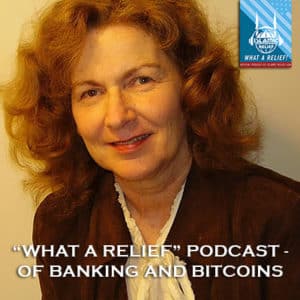 B.C. Dodge & R. Mordant Mahon talk to Kay Guinane, director of the Charity and Security Network, in this episode of “What a Relief!” — IRUSA’s official podcast.
B.C. Dodge & R. Mordant Mahon talk to Kay Guinane, director of the Charity and Security Network, in this episode of “What a Relief!” — IRUSA’s official podcast.
After you choose a cause and hit “donate,” did you ever think about complicated it can be to get your money where it needs to go?
This week, B.C. Dodge and R. Mordant Mahon talk with a specialist who describes the challenges of a convoluted banking system — and some surprisingly fun and creative solutions.
Kay Guinane is director of the Charity and Security Network, a coalition of organizations who examine the ways national security laws and regulations affect charities’ work. Her group looks for ways to smooth out some of the wrinkles for nonprofits so they can get humanitarian aid to people who need it.
In this podcast, Guinane sheds some light on a system in which banks work with other banks in between the sender and recipient, and each stop along the way requires assurance that a transaction is safe and legal.
Guinane said that often a holdup is at the level of an intermediary bank that doesn’t deal directly with the charity and isn’t familiar with the organization and its work. So it may halt the transaction and present the first bank with a list of questions to answer.
Those questions can range from reasonable to intrusive to simply bizarre, like the time a bank asked a charity for the maiden names of the mothers of all of the board members.
“We’re still trying to figure out why they thought that had anything to do with anything,” she said.
Guinane’s group found that two thirds of all the U.S. nonprofits operating internationally have problems with their banking services, and it doesn’t matter where they work. “So now we know we have a widespread, systemic problem,” she said.
It all sounds beaurocratic, but it gets real very quickly when you think about the consequences. Guinane said that in 2011, legal restrictions contributed to the higher-than-expected death rate during the famine in Somalia. And now famine is threatening the region again.
“It’s really important that nonprofit charity organizations be able to access the civilians in these areas to provide assistance so we don’t have a repeat of the disaster we had in 2011,” she said.
Guinane’s group is educating nonprofits on their rights. They are also learning how banks “think” and serving as a translator of sorts to prevent unnecessary holdups.
“Things that we think might raise a red flag with them might not be, and things we think aren’t important are things they think are,” she said.
For example, banks watch patterns of financial activity. So if a charity has an unusual transaction coming up, it can reach out to the bank ahead of time and tell them where the money is coming from and how it will be spent.
Mordant asked what happens when problems do crop up. Guinane said charities often just try again later.
The group also found that 42% of the charities resort to carrying cash sometimes.
“That’s not something any of us are happy about because it’s dangerous,” she said. “… But that tells us that charities are determined to serve the communities that need their help. They’re not going to be deterred.”
Only 3% of the charities they surveyed said they’d ever canceled a program because of these problems.
A few charities are beginning to try out a new and novel solution to some of these problems: Cryptocurrencies.
Yes, that’s as in bitcoins, the currency video games use.
“The U.N. is doing a pilot program using a cryptocurrency called ether. Residents of a camp are able to buy food using cryptocurrency.”
(Those who have listened to this program before can predict that the hosts are pretty thrilled here.)
“It seems like a radical step,” Guinane said, “but these currencies are becoming more and more accepted, and they are actually relatively transparent because the government can follow each transaction in what’s called the block chain a bitcoin or another cryptocurrency goes through.”
“If the regulated system can’t be made to work, something like this will have to be done. It’s new technology.”
To find out more, listen to the podcast.
LISTEN. SHARE. REPEAT.